Nursing Practice: Self-Evaluation, Feedback, and Development
VerifiedAdded on 2021/04/24
|7
|1350
|37
Homework Assignment
AI Summary
This assignment delves into the critical aspects of self-evaluation and professional development within nursing practice. It addresses key questions such as identifying individuals for self-evaluation, accepting negative feedback, giving and receiving feedback with colleagues and clients, and seeking assistance for areas needing improvement. The assignment explores how to align personal goals with organizational requirements, the benefits of participating in the review process, and strategies for protecting oneself from vulnerabilities. It also covers identifying industry developments, ensuring ethical and legal compliance, determining professional development opportunities, and regularly reviewing knowledge and skills. The student provides thoughtful answers to these questions, demonstrating an understanding of the importance of continuous self-assessment and professional growth in the nursing field, supported by relevant references.
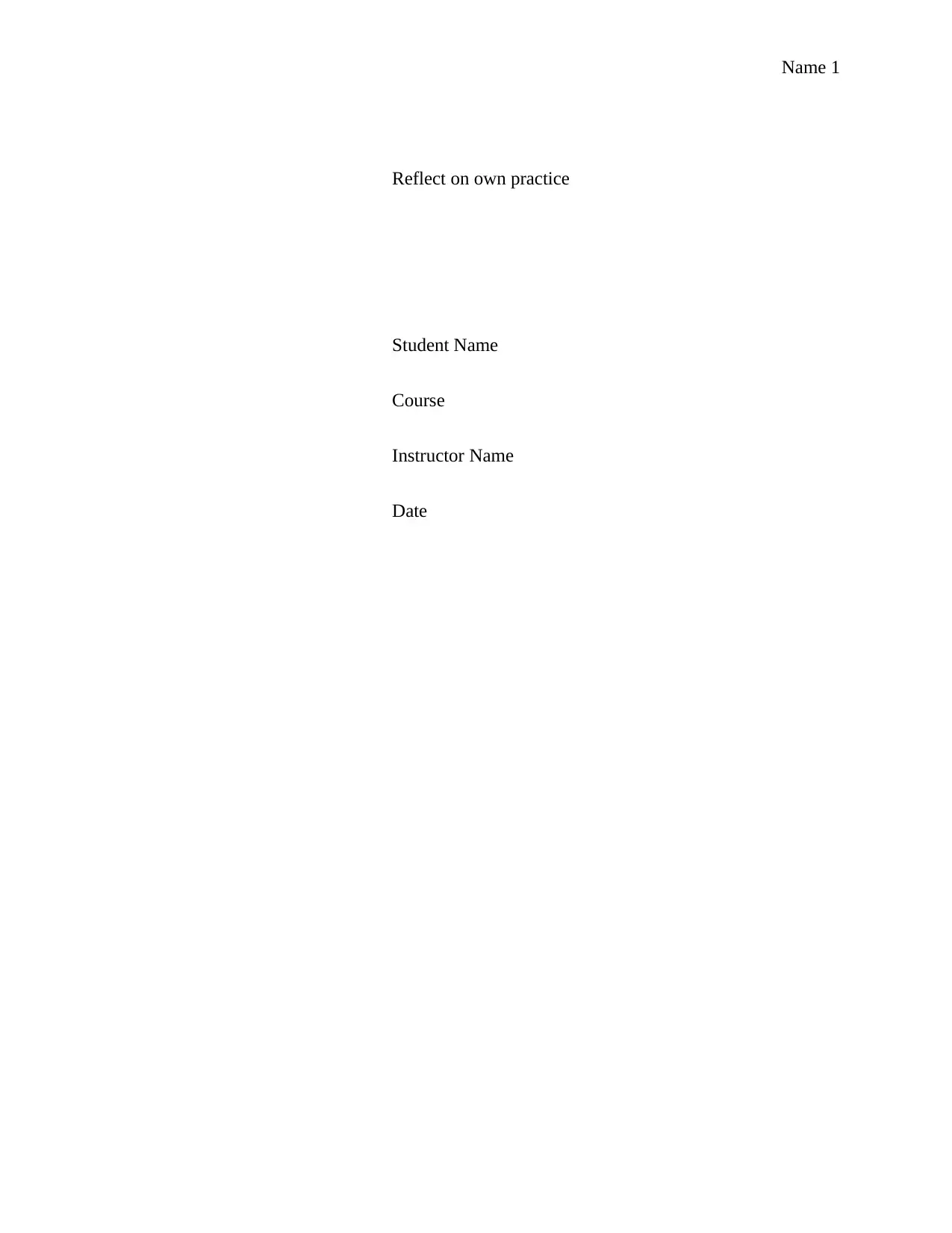
Name 1
Reflect on own practice
Student Name
Course
Instructor Name
Date
Reflect on own practice
Student Name
Course
Instructor Name
Date
Paraphrase This Document
Need a fresh take? Get an instant paraphrase of this document with our AI Paraphraser
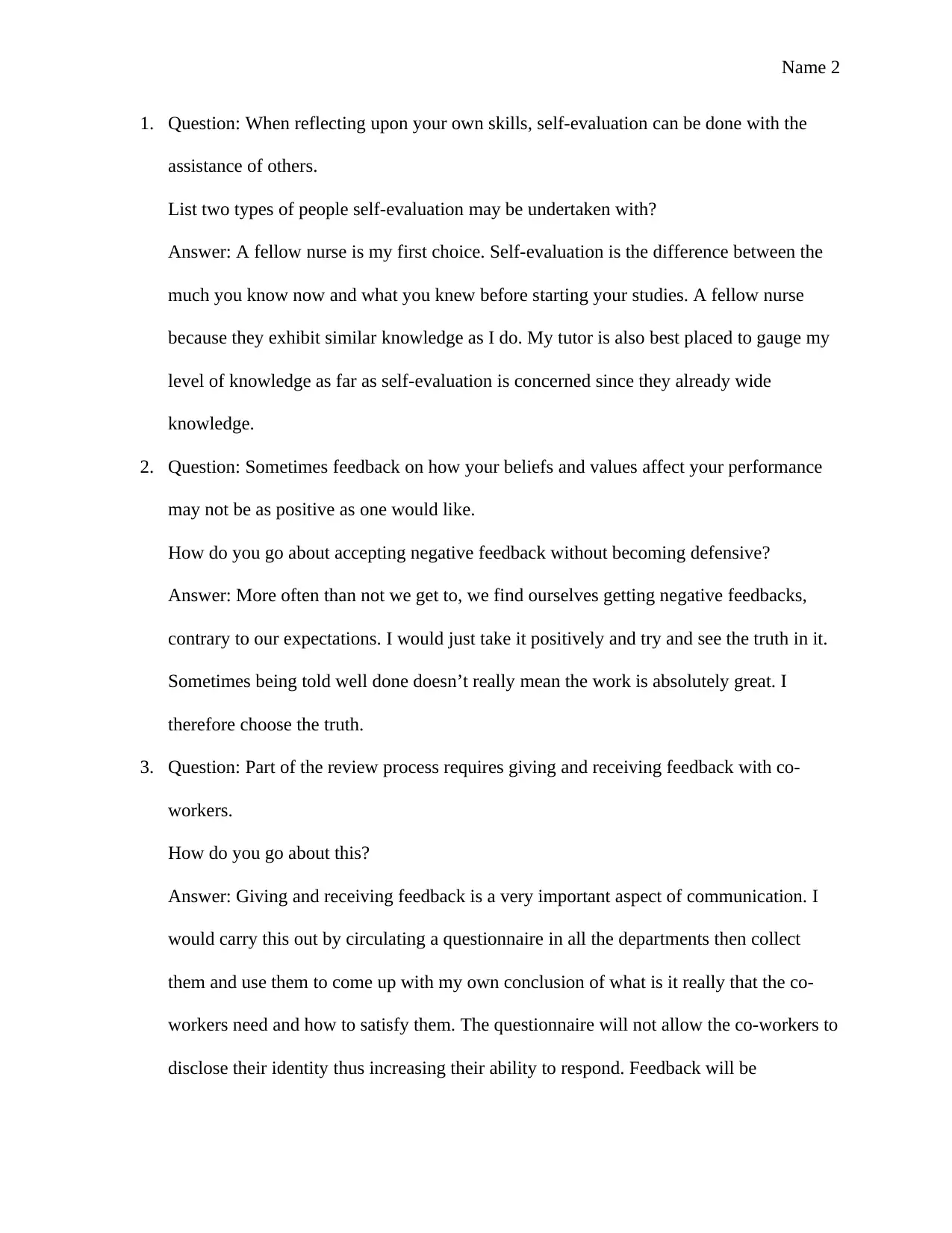
Name 2
1. Question: When reflecting upon your own skills, self-evaluation can be done with the
assistance of others.
List two types of people self-evaluation may be undertaken with?
Answer: A fellow nurse is my first choice. Self-evaluation is the difference between the
much you know now and what you knew before starting your studies. A fellow nurse
because they exhibit similar knowledge as I do. My tutor is also best placed to gauge my
level of knowledge as far as self-evaluation is concerned since they already wide
knowledge.
2. Question: Sometimes feedback on how your beliefs and values affect your performance
may not be as positive as one would like.
How do you go about accepting negative feedback without becoming defensive?
Answer: More often than not we get to, we find ourselves getting negative feedbacks,
contrary to our expectations. I would just take it positively and try and see the truth in it.
Sometimes being told well done doesn’t really mean the work is absolutely great. I
therefore choose the truth.
3. Question: Part of the review process requires giving and receiving feedback with co-
workers.
How do you go about this?
Answer: Giving and receiving feedback is a very important aspect of communication. I
would carry this out by circulating a questionnaire in all the departments then collect
them and use them to come up with my own conclusion of what is it really that the co-
workers need and how to satisfy them. The questionnaire will not allow the co-workers to
disclose their identity thus increasing their ability to respond. Feedback will be
1. Question: When reflecting upon your own skills, self-evaluation can be done with the
assistance of others.
List two types of people self-evaluation may be undertaken with?
Answer: A fellow nurse is my first choice. Self-evaluation is the difference between the
much you know now and what you knew before starting your studies. A fellow nurse
because they exhibit similar knowledge as I do. My tutor is also best placed to gauge my
level of knowledge as far as self-evaluation is concerned since they already wide
knowledge.
2. Question: Sometimes feedback on how your beliefs and values affect your performance
may not be as positive as one would like.
How do you go about accepting negative feedback without becoming defensive?
Answer: More often than not we get to, we find ourselves getting negative feedbacks,
contrary to our expectations. I would just take it positively and try and see the truth in it.
Sometimes being told well done doesn’t really mean the work is absolutely great. I
therefore choose the truth.
3. Question: Part of the review process requires giving and receiving feedback with co-
workers.
How do you go about this?
Answer: Giving and receiving feedback is a very important aspect of communication. I
would carry this out by circulating a questionnaire in all the departments then collect
them and use them to come up with my own conclusion of what is it really that the co-
workers need and how to satisfy them. The questionnaire will not allow the co-workers to
disclose their identity thus increasing their ability to respond. Feedback will be
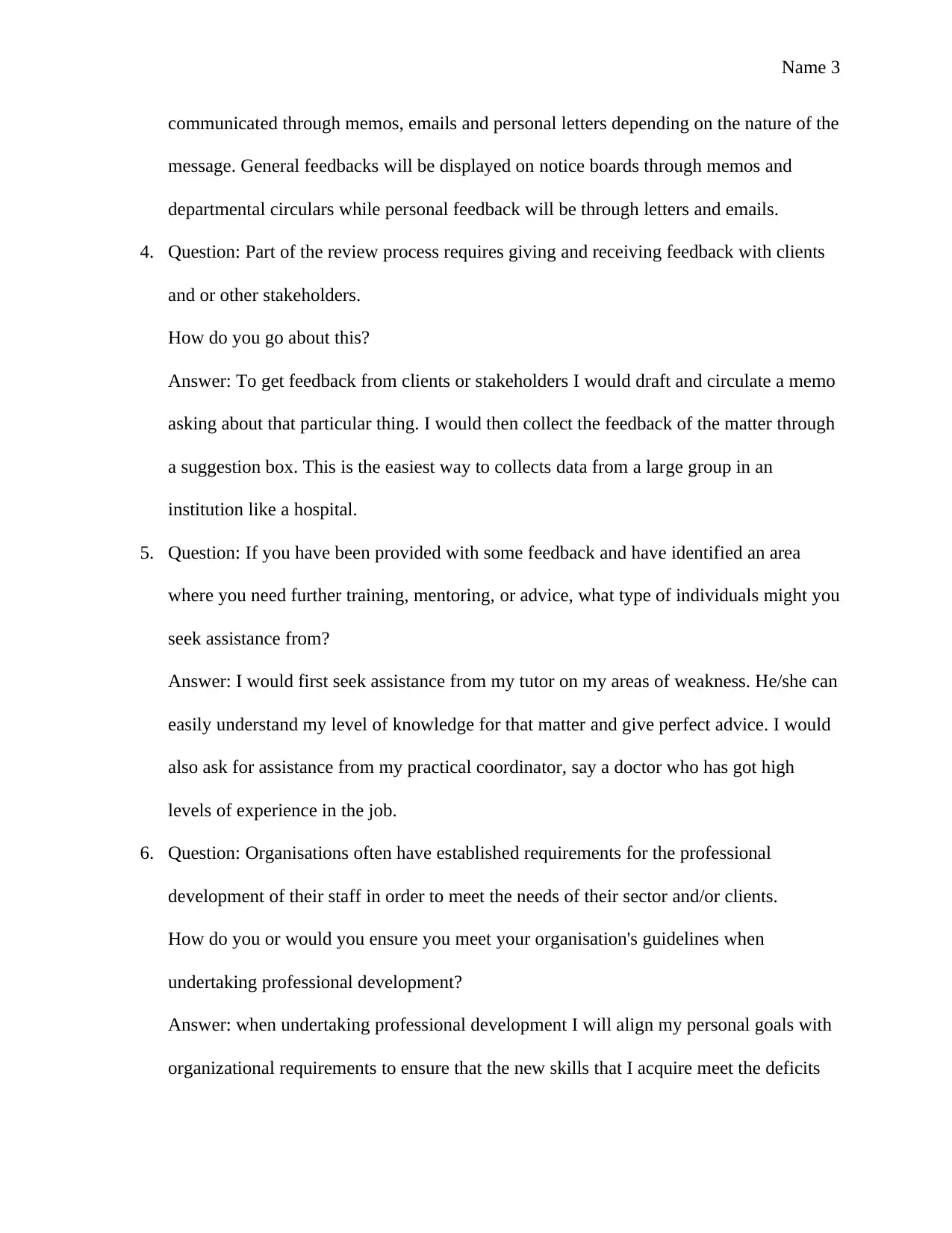
Name 3
communicated through memos, emails and personal letters depending on the nature of the
message. General feedbacks will be displayed on notice boards through memos and
departmental circulars while personal feedback will be through letters and emails.
4. Question: Part of the review process requires giving and receiving feedback with clients
and or other stakeholders.
How do you go about this?
Answer: To get feedback from clients or stakeholders I would draft and circulate a memo
asking about that particular thing. I would then collect the feedback of the matter through
a suggestion box. This is the easiest way to collects data from a large group in an
institution like a hospital.
5. Question: If you have been provided with some feedback and have identified an area
where you need further training, mentoring, or advice, what type of individuals might you
seek assistance from?
Answer: I would first seek assistance from my tutor on my areas of weakness. He/she can
easily understand my level of knowledge for that matter and give perfect advice. I would
also ask for assistance from my practical coordinator, say a doctor who has got high
levels of experience in the job.
6. Question: Organisations often have established requirements for the professional
development of their staff in order to meet the needs of their sector and/or clients.
How do you or would you ensure you meet your organisation's guidelines when
undertaking professional development?
Answer: when undertaking professional development I will align my personal goals with
organizational requirements to ensure that the new skills that I acquire meet the deficits
communicated through memos, emails and personal letters depending on the nature of the
message. General feedbacks will be displayed on notice boards through memos and
departmental circulars while personal feedback will be through letters and emails.
4. Question: Part of the review process requires giving and receiving feedback with clients
and or other stakeholders.
How do you go about this?
Answer: To get feedback from clients or stakeholders I would draft and circulate a memo
asking about that particular thing. I would then collect the feedback of the matter through
a suggestion box. This is the easiest way to collects data from a large group in an
institution like a hospital.
5. Question: If you have been provided with some feedback and have identified an area
where you need further training, mentoring, or advice, what type of individuals might you
seek assistance from?
Answer: I would first seek assistance from my tutor on my areas of weakness. He/she can
easily understand my level of knowledge for that matter and give perfect advice. I would
also ask for assistance from my practical coordinator, say a doctor who has got high
levels of experience in the job.
6. Question: Organisations often have established requirements for the professional
development of their staff in order to meet the needs of their sector and/or clients.
How do you or would you ensure you meet your organisation's guidelines when
undertaking professional development?
Answer: when undertaking professional development I will align my personal goals with
organizational requirements to ensure that the new skills that I acquire meet the deficits
⊘ This is a preview!⊘
Do you want full access?
Subscribe today to unlock all pages.

Trusted by 1+ million students worldwide
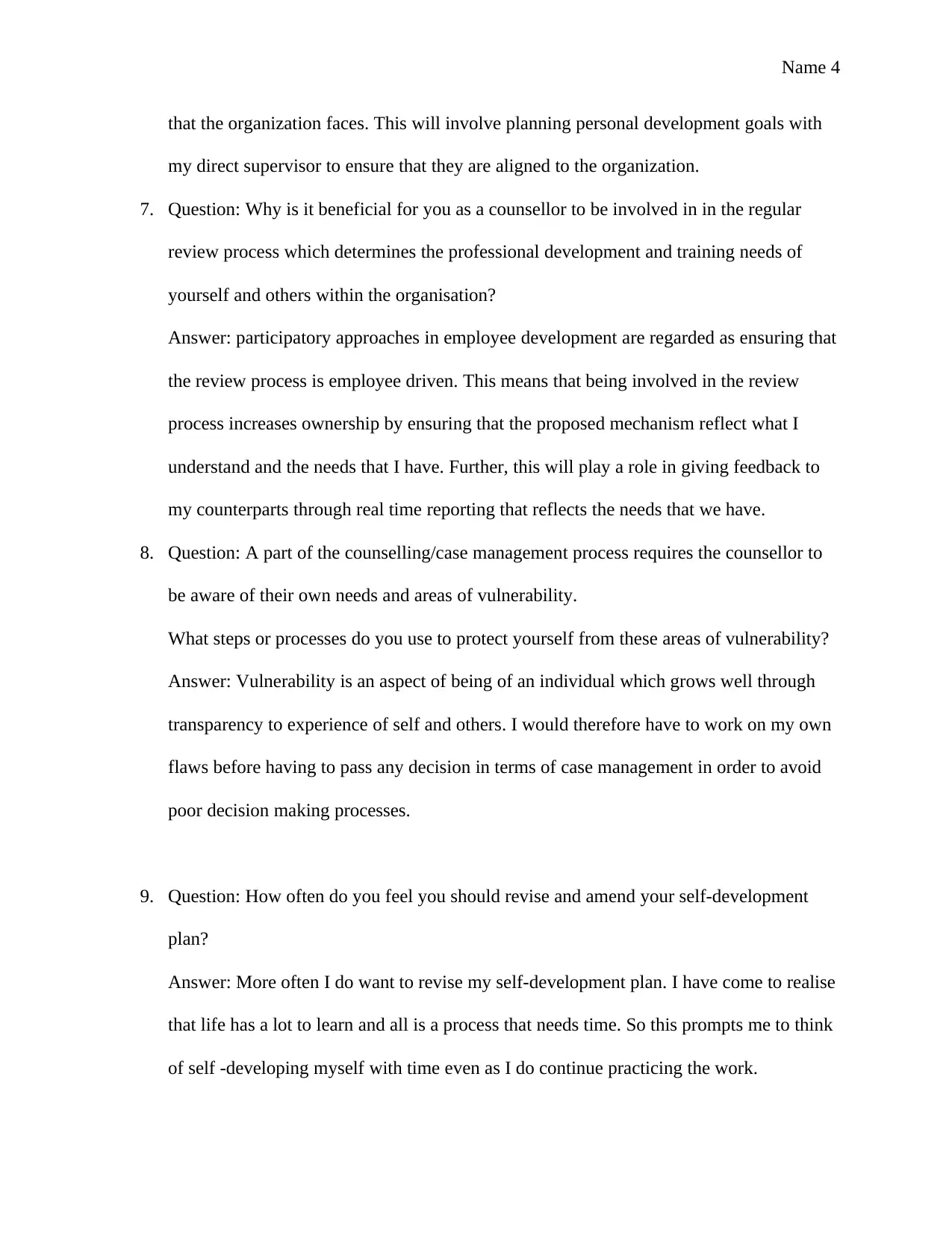
Name 4
that the organization faces. This will involve planning personal development goals with
my direct supervisor to ensure that they are aligned to the organization.
7. Question: Why is it beneficial for you as a counsellor to be involved in in the regular
review process which determines the professional development and training needs of
yourself and others within the organisation?
Answer: participatory approaches in employee development are regarded as ensuring that
the review process is employee driven. This means that being involved in the review
process increases ownership by ensuring that the proposed mechanism reflect what I
understand and the needs that I have. Further, this will play a role in giving feedback to
my counterparts through real time reporting that reflects the needs that we have.
8. Question: A part of the counselling/case management process requires the counsellor to
be aware of their own needs and areas of vulnerability.
What steps or processes do you use to protect yourself from these areas of vulnerability?
Answer: Vulnerability is an aspect of being of an individual which grows well through
transparency to experience of self and others. I would therefore have to work on my own
flaws before having to pass any decision in terms of case management in order to avoid
poor decision making processes.
9. Question: How often do you feel you should revise and amend your self-development
plan?
Answer: More often I do want to revise my self-development plan. I have come to realise
that life has a lot to learn and all is a process that needs time. So this prompts me to think
of self -developing myself with time even as I do continue practicing the work.
that the organization faces. This will involve planning personal development goals with
my direct supervisor to ensure that they are aligned to the organization.
7. Question: Why is it beneficial for you as a counsellor to be involved in in the regular
review process which determines the professional development and training needs of
yourself and others within the organisation?
Answer: participatory approaches in employee development are regarded as ensuring that
the review process is employee driven. This means that being involved in the review
process increases ownership by ensuring that the proposed mechanism reflect what I
understand and the needs that I have. Further, this will play a role in giving feedback to
my counterparts through real time reporting that reflects the needs that we have.
8. Question: A part of the counselling/case management process requires the counsellor to
be aware of their own needs and areas of vulnerability.
What steps or processes do you use to protect yourself from these areas of vulnerability?
Answer: Vulnerability is an aspect of being of an individual which grows well through
transparency to experience of self and others. I would therefore have to work on my own
flaws before having to pass any decision in terms of case management in order to avoid
poor decision making processes.
9. Question: How often do you feel you should revise and amend your self-development
plan?
Answer: More often I do want to revise my self-development plan. I have come to realise
that life has a lot to learn and all is a process that needs time. So this prompts me to think
of self -developing myself with time even as I do continue practicing the work.
Paraphrase This Document
Need a fresh take? Get an instant paraphrase of this document with our AI Paraphraser
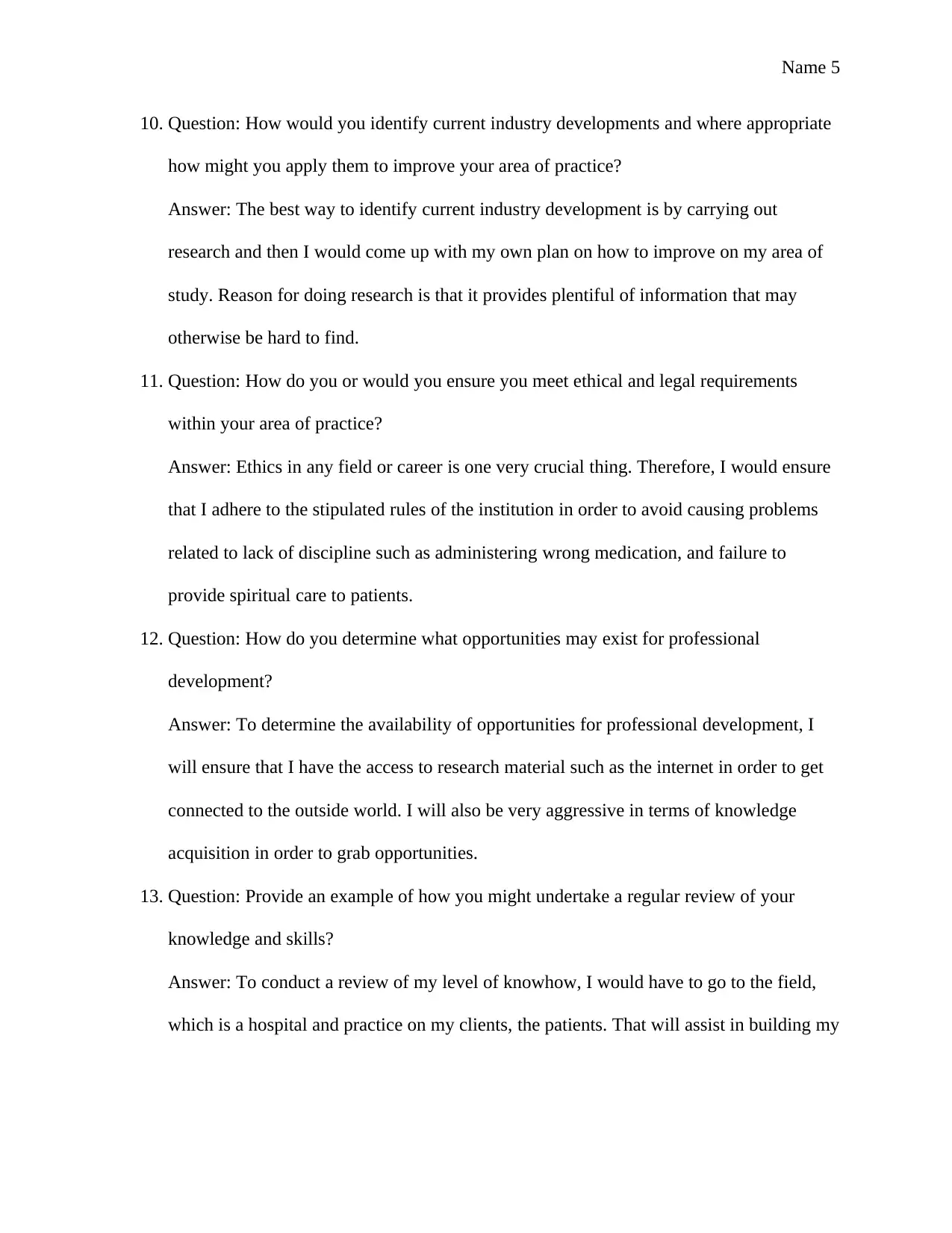
Name 5
10. Question: How would you identify current industry developments and where appropriate
how might you apply them to improve your area of practice?
Answer: The best way to identify current industry development is by carrying out
research and then I would come up with my own plan on how to improve on my area of
study. Reason for doing research is that it provides plentiful of information that may
otherwise be hard to find.
11. Question: How do you or would you ensure you meet ethical and legal requirements
within your area of practice?
Answer: Ethics in any field or career is one very crucial thing. Therefore, I would ensure
that I adhere to the stipulated rules of the institution in order to avoid causing problems
related to lack of discipline such as administering wrong medication, and failure to
provide spiritual care to patients.
12. Question: How do you determine what opportunities may exist for professional
development?
Answer: To determine the availability of opportunities for professional development, I
will ensure that I have the access to research material such as the internet in order to get
connected to the outside world. I will also be very aggressive in terms of knowledge
acquisition in order to grab opportunities.
13. Question: Provide an example of how you might undertake a regular review of your
knowledge and skills?
Answer: To conduct a review of my level of knowhow, I would have to go to the field,
which is a hospital and practice on my clients, the patients. That will assist in building my
10. Question: How would you identify current industry developments and where appropriate
how might you apply them to improve your area of practice?
Answer: The best way to identify current industry development is by carrying out
research and then I would come up with my own plan on how to improve on my area of
study. Reason for doing research is that it provides plentiful of information that may
otherwise be hard to find.
11. Question: How do you or would you ensure you meet ethical and legal requirements
within your area of practice?
Answer: Ethics in any field or career is one very crucial thing. Therefore, I would ensure
that I adhere to the stipulated rules of the institution in order to avoid causing problems
related to lack of discipline such as administering wrong medication, and failure to
provide spiritual care to patients.
12. Question: How do you determine what opportunities may exist for professional
development?
Answer: To determine the availability of opportunities for professional development, I
will ensure that I have the access to research material such as the internet in order to get
connected to the outside world. I will also be very aggressive in terms of knowledge
acquisition in order to grab opportunities.
13. Question: Provide an example of how you might undertake a regular review of your
knowledge and skills?
Answer: To conduct a review of my level of knowhow, I would have to go to the field,
which is a hospital and practice on my clients, the patients. That will assist in building my
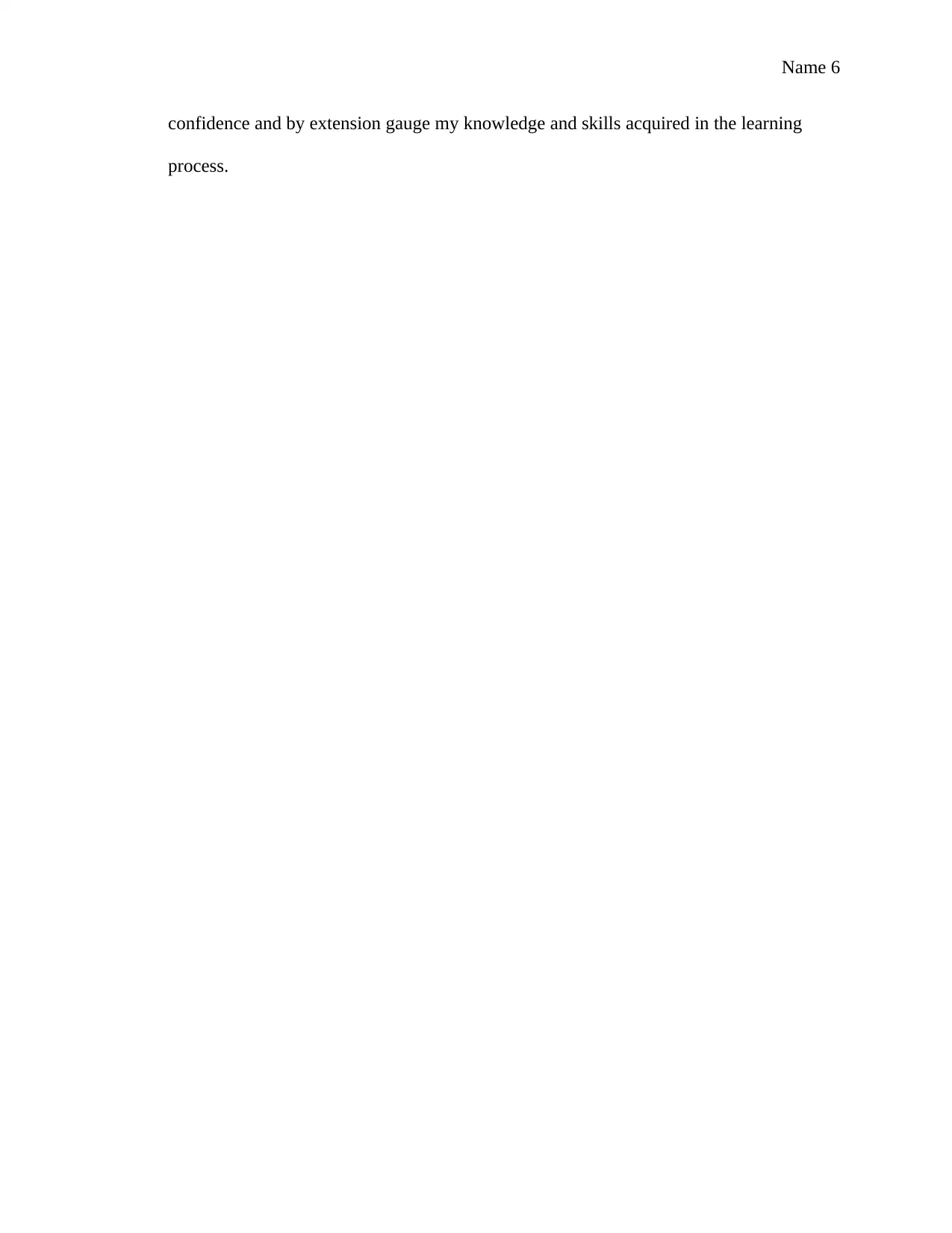
Name 6
confidence and by extension gauge my knowledge and skills acquired in the learning
process.
confidence and by extension gauge my knowledge and skills acquired in the learning
process.
⊘ This is a preview!⊘
Do you want full access?
Subscribe today to unlock all pages.

Trusted by 1+ million students worldwide
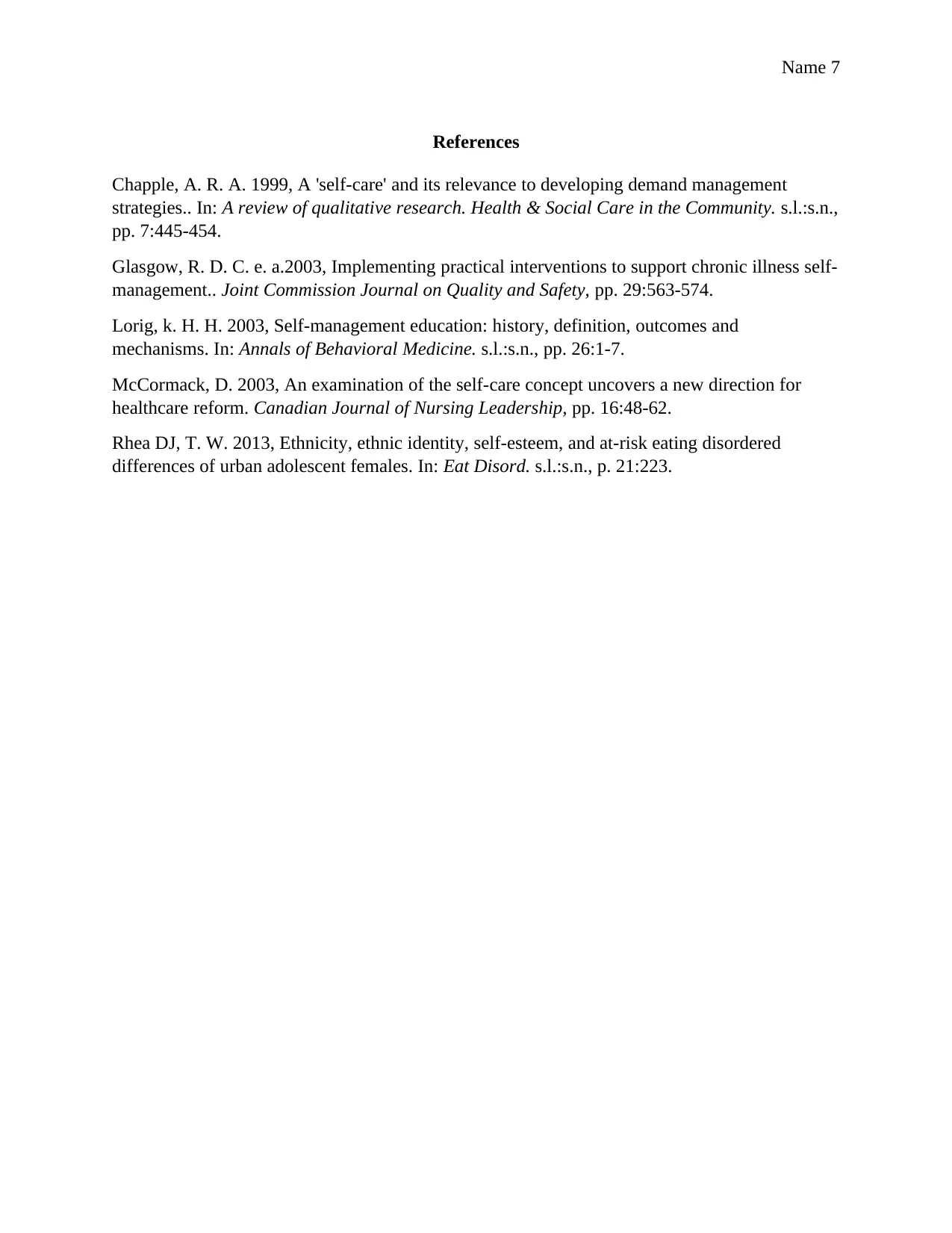
Name 7
References
Chapple, A. R. A. 1999, A 'self-care' and its relevance to developing demand management
strategies.. In: A review of qualitative research. Health & Social Care in the Community. s.l.:s.n.,
pp. 7:445-454.
Glasgow, R. D. C. e. a.2003, Implementing practical interventions to support chronic illness self-
management.. Joint Commission Journal on Quality and Safety, pp. 29:563-574.
Lorig, k. H. H. 2003, Self-management education: history, definition, outcomes and
mechanisms. In: Annals of Behavioral Medicine. s.l.:s.n., pp. 26:1-7.
McCormack, D. 2003, An examination of the self-care concept uncovers a new direction for
healthcare reform. Canadian Journal of Nursing Leadership, pp. 16:48-62.
Rhea DJ, T. W. 2013, Ethnicity, ethnic identity, self-esteem, and at-risk eating disordered
differences of urban adolescent females. In: Eat Disord. s.l.:s.n., p. 21:223.
References
Chapple, A. R. A. 1999, A 'self-care' and its relevance to developing demand management
strategies.. In: A review of qualitative research. Health & Social Care in the Community. s.l.:s.n.,
pp. 7:445-454.
Glasgow, R. D. C. e. a.2003, Implementing practical interventions to support chronic illness self-
management.. Joint Commission Journal on Quality and Safety, pp. 29:563-574.
Lorig, k. H. H. 2003, Self-management education: history, definition, outcomes and
mechanisms. In: Annals of Behavioral Medicine. s.l.:s.n., pp. 26:1-7.
McCormack, D. 2003, An examination of the self-care concept uncovers a new direction for
healthcare reform. Canadian Journal of Nursing Leadership, pp. 16:48-62.
Rhea DJ, T. W. 2013, Ethnicity, ethnic identity, self-esteem, and at-risk eating disordered
differences of urban adolescent females. In: Eat Disord. s.l.:s.n., p. 21:223.
1 out of 7
Related Documents
Your All-in-One AI-Powered Toolkit for Academic Success.
+13062052269
info@desklib.com
Available 24*7 on WhatsApp / Email
![[object Object]](/_next/static/media/star-bottom.7253800d.svg)
Unlock your academic potential
Copyright © 2020–2026 A2Z Services. All Rights Reserved. Developed and managed by ZUCOL.





![Reflective Report: Understanding Self and Others - [Course Name]](/_next/image/?url=https%3A%2F%2Fdesklib.com%2Fmedia%2Fimages%2Fgq%2F76eb7e72b9214f70a5066d411dce44bf.jpg&w=256&q=75)